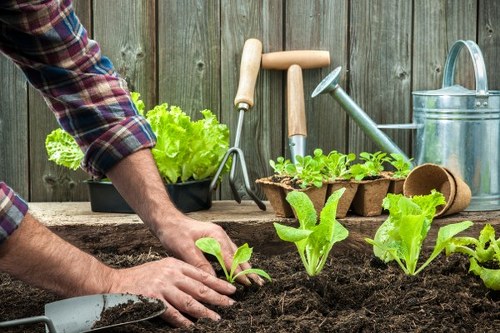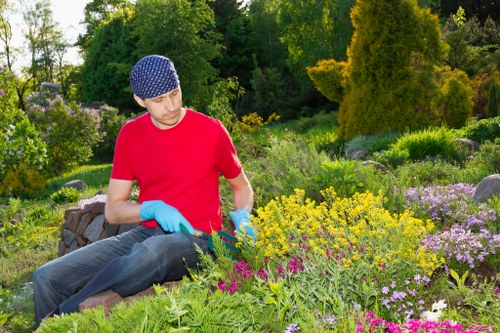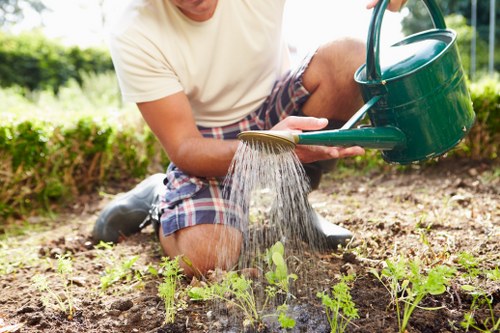Comprehensive Guide to Garden Maintenance in Highbury

Maintaining a beautiful garden in Highbury requires dedication, knowledge, and the right set of tools. Whether you're a seasoned gardener or a beginner, understanding the specific needs of your garden can make all the difference. In this guide, we'll explore essential tips and strategies to keep your garden thriving throughout the year.
Highbury's climate plays a significant role in determining the best practices for garden maintenance. With its mild winters and warm summers, gardeners have a unique opportunity to cultivate a wide variety of plants.
Regular garden maintenance not only enhances the aesthetic appeal of your outdoor space but also promotes the health and longevity of your plants. From soil preparation to pest control, every aspect requires attention and care.

Essential Garden Maintenance Tasks
Keeping your garden in top shape involves a series of tasks that should be performed regularly. Below are some of the most important maintenance activities every Highbury gardener should incorporate into their routine.
Pruning and Trimming: Regular pruning helps in removing dead or diseased branches, encouraging new growth and maintaining the shape of your plants.
Weed Control: Weeds compete with your plants for nutrients and water. Effective weed management ensures that your garden remains healthy and vibrant.

Seasonal Maintenance Tips
- Spring: Start by clearing any debris left over from winter, prepare your soil, and plant new seeds or seedlings.
- Summer: Focus on watering, weeding, and protecting your plants from pests and excessive heat.
- Autumn: Harvest your crops, mulch your beds, and prepare your garden for the colder months.
- Winter: Prune trees and shrubs, plan for the next planting season, and protect sensitive plants from frost.

Choosing the Right Plants for Highbury Gardens
Selecting plants that thrive in Highbury's climate is crucial for a successful garden. Consider the following factors when choosing your plants:
- Climate Compatibility: Choose plants that are well-suited to the local climate to reduce maintenance efforts.
- Soil Type: Understanding your soil's pH and composition can help in selecting plants that will flourish.
- Sunlight Exposure: Ensure that your plants receive the appropriate amount of sunlight based on their specific needs.
- Water Requirements: Group plants with similar water needs together to make irrigation more efficient.

Organic Gardening Practices
Embracing organic gardening practices can lead to a healthier garden and a more sustainable environment. Here are some tips to get you started:
Composting: Recycle kitchen scraps and garden waste to create nutrient-rich compost for your plants.
Natural Pest Control: Use beneficial insects, such as ladybugs, to manage pest populations without harmful chemicals.
Mulching: Apply organic mulch to retain soil moisture, regulate temperature, and suppress weed growth.
Tools and Equipment for Effective Maintenance
Having the right tools can significantly ease the maintenance process. Invest in quality equipment to ensure efficiency and longevity.
- Pruning Shears: Essential for trimming and shaping plants.
- Garden Fork: Useful for turning soil and removing weeds.
- Watering System: Whether it's hoses or drip irrigation, proper watering tools are vital.
Maintaining your tools by cleaning and storing them properly will extend their usability and performance.
Hiring Professional Garden Maintenance Services
For those who prefer to leave garden care to the experts, hiring a professional service in Highbury can be a great option. Professionals bring expertise, efficiency, and a keen eye for detail to ensure your garden remains pristine.
When selecting a service, consider the following:
- Experience: Look for companies with a proven track record in garden maintenance.
- Services Offered: Ensure they provide the specific services you need, such as landscaping, pruning, or pest control.
- Customer Reviews: Testimonials can provide insight into the quality and reliability of the service.
Investing in professional maintenance can save you time and ensure your garden achieves its full potential.
Eco-Friendly Maintenance Practices
Adopting eco-friendly practices not only benefits your garden but also the environment. Here are some sustainable methods to incorporate into your garden maintenance routine:
- Rainwater Harvesting: Collecting rainwater reduces water usage and provides a natural source for your garden.
- Organic Fertilizers: Use compost or natural fertilizers to nourish your plants without harmful chemicals.
- Native Plants: Planting native species supports local wildlife and requires less maintenance.
Implementing these practices contributes to a healthier ecosystem and a more resilient garden.
Common Challenges in Garden Maintenance
Even with the best practices, gardeners may face challenges. Being prepared can help you tackle these issues effectively.
Pest Infestations: Regular monitoring and natural pest control methods can prevent infestations from taking hold.
Disease Management: Identifying and treating plant diseases early can save your garden from widespread damage.
Weather Extremes: Protect your plants from unexpected weather changes by using appropriate coverings and landscaping techniques.
Soil Health and Fertility
Healthy soil is the foundation of a thriving garden. Maintaining soil fertility involves regular testing and amendments.
Soil Testing: Determine the pH and nutrient levels to understand what your soil needs.
Amendments: Add compost, manure, or specific fertilizers to improve soil structure and fertility.
Crop Rotation: Changing the types of plants grown in each area annually can prevent nutrient depletion and reduce pest buildup.
Watering Strategies
Efficient watering is crucial for plant health and water conservation. Here are some strategies to optimize your watering routine:
- Drip Irrigation: Delivers water directly to the plant roots, minimizing waste.
- Mulching: Helps retain moisture in the soil, reducing the need for frequent watering.
- Morning Watering: Watering in the early hours reduces evaporation and allows plants to absorb moisture before the heat of the day.
Monitoring soil moisture levels can also help in adjusting watering schedules to match the needs of your plants.
Landscape Design and Maintenance
A well-designed landscape enhances the beauty and functionality of your garden. Combining aesthetics with practical maintenance makes for a harmonious outdoor space.
Pathways and Hardscaping: Incorporate pathways and hard elements to guide movement and add structure.
Plant Selection: Choose a mix of evergreen and seasonal plants to ensure year-round interest.
Lighting: Proper lighting not only highlights key features but also extends the usability of your garden into the evening.
Pruning Techniques
Effective pruning promotes plant health and enhances the appearance of your garden. Here are some techniques to consider:
- Thinning: Remove excess branches to improve air circulation and reduce disease risk.
- Heading: Shorten branches to encourage bushier growth.
- Pinching: Remove the tips of stems to stimulate the growth of side branches.
Always use clean and sharp tools to make precise cuts, minimizing damage to the plants.
Mulching Benefits
Mulching offers numerous advantages for your garden, including moisture retention, temperature regulation, and weed suppression.
- Moisture Retention: Mulch helps keep the soil moist by reducing evaporation.
- Temperature Regulation: It insulates the soil, protecting roots from extreme temperatures.
- Weed Suppression: A thick layer of mulch inhibits the growth of unwanted weeds.
Choose organic mulches, such as bark or straw, to enrich the soil as they decompose.
Integrated Pest Management (IPM)
IPM is a sustainable approach to managing pests by combining biological, cultural, and chemical methods.
Biological Control: Introduce natural predators to keep pest populations in check.
Cultural Practices: Rotate crops and plant pest-resistant varieties to reduce vulnerability.
Chemical Control: Use pesticides as a last resort and opt for environmentally friendly options.
Maintaining Garden Health
A healthy garden is resilient and requires less maintenance. Focus on practices that promote overall plant health.
Regular Inspections: Check your plants frequently for signs of stress, disease, or pest infestations.
Balanced Nutrition: Provide your plants with the right nutrients through proper fertilization and soil management.
Stress Reduction: Protect plants from environmental stressors such as wind, excessive heat, and heavy rains.
Attracting Wildlife
Encouraging wildlife in your garden can enhance its ecosystem and provide natural pest control.
- Bird Feeders: Attract birds that help in controlling insect populations.
- Butterfly Gardens: Plant nectar-rich flowers to invite butterflies and pollinators.
- Bee Hotels: Provide habitats for beneficial bees that aid in pollination.
Creating a diverse habitat supports a balanced and thriving garden environment.
Lighting and Irrigation Systems
Proper lighting and irrigation systems are essential for both the functionality and aesthetics of your garden.
Outdoor Lighting: Illuminate pathways, highlight garden features, and create ambiance for evening enjoyment.
Irrigation Systems: Automated systems ensure consistent watering, saving time and reducing water waste.
Solar Lighting: Eco-friendly options that utilize renewable energy for garden illumination.
Garden Safety Tips
Ensuring safety in your garden is paramount, especially if you have children or pets.
- Tool Storage: Keep gardening tools securely stored to prevent accidents.
- Toxic Plants: Be aware of and avoid planting species that are harmful if ingested.
- Pathway Maintenance: Ensure walkways are clear and free from tripping hazards.
Implementing these safety measures creates a secure and enjoyable outdoor space for everyone.
Sustainable Gardening Practices
Adopting sustainable practices in your garden reduces environmental impact and promotes long-term health.
Composting: Recycle organic waste to create nutrient-rich soil amendments.
Rain Gardens: Designate areas to capture and utilize rainwater, reducing runoff and conserving water.
Perennials: Planting perennial species reduces the need for annual replanting and maintenance.
Enhancing Garden Aesthetics
Aesthetically pleasing gardens offer a sanctuary and can increase property value. Focus on elements that enhance visual appeal.
Color Coordination: Plan your plantings to create harmonious color schemes and seasonal interest.
Focal Points: Incorporate features such as sculptures, fountains, or unique plant arrangements to draw attention.
Texture and Form: Combine different plant textures and forms to add depth and dimension to your garden.
Maintaining Lawn Health
A well-maintained lawn contributes to the overall beauty of your garden. Follow these tips to keep your lawn lush and green:
- Mowing: Regular mowing at the appropriate height encourages healthy grass growth.
- Fertilizing: Apply fertilizers based on soil tests to provide necessary nutrients.
- Aeration: Aerate your lawn annually to improve soil structure and root growth.
Proper lawn care minimizes weeds and promotes a vibrant green space.
Flower Bed Maintenance
Flower beds add color and charm to your garden. Maintaining them involves regular care and attention.
- Deadheading: Remove spent flowers to encourage new blooms and maintain a tidy appearance.
- Weed Removal: Keep flower beds free from weeds to prevent competition for resources.
- Soil Enrichment: Regularly amend the soil with compost or organic matter to support healthy plant growth.
By maintaining your flower beds, you ensure a vibrant and attractive garden year-round.
Garden Tools Maintenance
Properly maintained tools enhance efficiency and longevity, making garden tasks easier and more enjoyable.
Cleaning: Remove dirt and debris after each use to prevent rust and corrosion.
Sharpening: Keep blades sharp to ensure clean cuts and reduce strain on your plants.
Storage: Store tools in a dry, secure place to protect them from the elements and unauthorized use.
Creating a Sustainable Garden
Sustainability in gardening involves practices that are environmentally responsible and resource-efficient. Here's how to create a sustainable garden in Highbury:
Native Plant Selection: Choose plants that are indigenous to the area, as they are better adapted to the local climate and require less maintenance.
Water Conservation: Implement watering techniques that minimize water usage, such as drip irrigation and rainwater harvesting.
Soil Health: Maintain healthy soil through organic amendments and by avoiding chemical fertilizers and pesticides.
Garden Layout Planning
Effective garden layout planning ensures functionality and visual appeal. Consider the following when designing your garden layout:
- Accessibility: Ensure pathways and areas are easily accessible for maintenance and enjoyment.
- Plant Placement: Arrange plants based on their sunlight, water, and space requirements.
- Theme and Style: Decide on a garden theme or style that reflects your personal taste and complements your home.
A well-planned layout makes maintenance more manageable and enhances the garden's overall beauty.
Using Organic Fertilizers
Organic fertilizers improve soil health without the negative impacts of chemical alternatives. Here are some popular options:
- Compost: A rich, organic material created from decomposed plant and kitchen waste.
- Manure: A natural fertilizer that adds essential nutrients to the soil.
- Bone Meal: Provides phosphorus, promoting strong root development.
Incorporating organic fertilizers into your maintenance routine supports sustainable gardening practices.
Protecting Plants from Pests
Protecting your plants from pests is vital for maintaining a healthy garden. Implement the following strategies:
Physical Barriers: Use nets or garden fleece to prevent pests from reaching your plants.
Companion Planting: Grow plants that naturally repel pests alongside your main crops.
Regular Monitoring: Inspect plants regularly to detect and address pest issues early.
Maintaining Garden Pathways
Garden pathways not only add structure but also guide visitors through your garden. Proper maintenance ensures they remain functional and attractive.
Weed Control: Keep pathways free from weeds to maintain a clean appearance.
Repairing Surfaces: Fix any cracks or uneven areas to prevent accidents and preserve the pathway's integrity.
Decorative Elements: Incorporate stones, gravel, or mulch to enhance the aesthetic appeal of your pathways.
Composting Basics
Composting turns organic waste into valuable soil amendments, enriching your garden sustainably.
- Materials: Combine green materials (kitchen scraps, grass clippings) with brown materials (leaves, straw) for balanced compost.
- Aeration: Turn the compost pile regularly to provide oxygen, accelerating decomposition.
- Moisture Control: Maintain moisture levels similar to a damp sponge to facilitate microbial activity.
Successfully composting reduces waste and improves soil health in your garden.
Cover Crops and Green Manures
Using cover crops and green manures enhances soil fertility and structure.
- Nitrogen Fixation: Leguminous cover crops, such as clover, add nitrogen to the soil.
- Soil Structure: Root systems of cover crops improve soil aeration and reduce compaction.
- Erosion Control: Dense vegetation cover protects the soil from erosion caused by wind and rain.
Incorporating cover crops into your gardening cycle supports sustainable soil management.
Harvesting Techniques
Proper harvesting techniques ensure the quality and longevity of your produce. Follow these guidelines:
Timing: Harvest crops at their peak ripeness for the best flavor and nutritional value.
Tools: Use sharp, clean tools to make precise cuts, minimizing damage to the plants.
Handling: Handle produce gently to prevent bruising and extend shelf life.
Final Thoughts on Garden Maintenance in Highbury
Effective garden maintenance in Highbury combines knowledge, dedication, and sustainable practices. By understanding the local climate, selecting appropriate plants, and implementing regular maintenance routines, you can cultivate a thriving and beautiful garden.
Remember to continuously educate yourself on best practices and consider consulting with local gardening experts or professional maintenance services to enhance your garden's health and aesthetics.
Ready to transform your garden? Contact us today to schedule a consultation with our expert garden maintenance team in Highbury.
